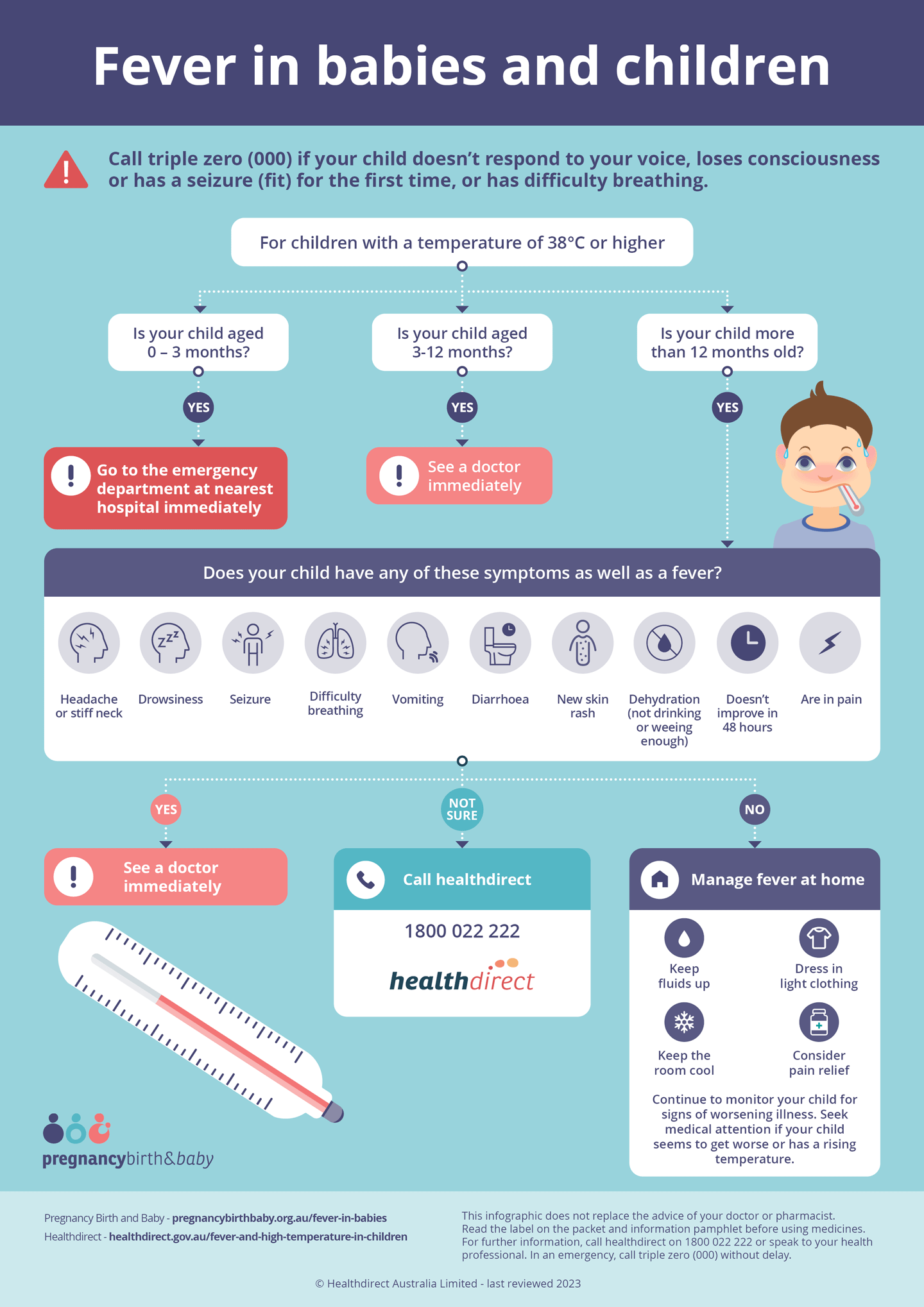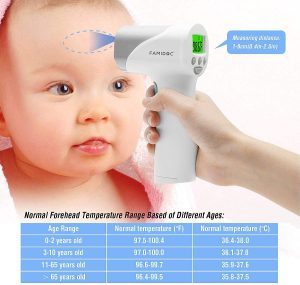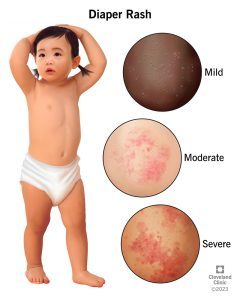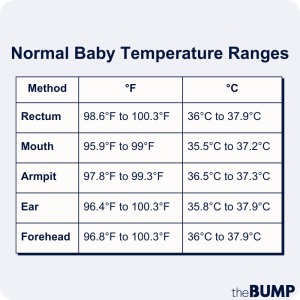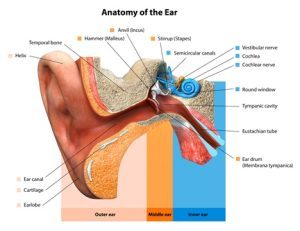Fever in babies can be concerning if it is higher than 100.4 degrees Fahrenheit and persists for more than a day. It is important to monitor the baby’s temperature and seek medical advice if necessary.
When a baby has a fever, it can be a sign of an underlying infection or illness. While some fevers can be managed at home with proper care and medication, persistent high fever or other concerning symptoms should prompt a visit to a healthcare provider.
This article will discuss common causes of fever in babies, when to seek medical help, and how to provide comfort to a feverish baby.

Causes Of Fever In Babies
Fever in babies can be a cause of concern for parents, and it is important to understand the different causes of fever in babies. Knowing the potential reasons behind your baby’s fever can help you make informed decisions about seeking medical attention.
Viral Infections
Viral infections are a common cause of fever in babies. The most common viral illnesses in babies include colds, flu, and respiratory syncytial virus (RSV). These viruses can cause a sudden onset of fever, accompanied by symptoms like coughing, congestion, and irritability.
Bacterial Infections
Bacterial infections can also lead to fever in babies. Conditions such as urinary tract infections, pneumonia, and bacterial meningitis can cause persistent fever and may be accompanied by symptoms like lethargy, poor feeding, and difficulty breathing. It is essential to seek medical attention promptly if you suspect a bacterial infection.
Teething
Teething can cause a slight increase in body temperature in some babies. While teething is not a serious medical condition, it is important to differentiate teething-related fever from other causes of fever. Teething fever is typically low-grade and is often accompanied by symptoms like drooling, irritability, and chewing on objects.

Common Symptoms To Look For
When it comes to identifying fever in babies, it’s crucial to be aware of the common symptoms to look for. Recognizing these signs can help parents take appropriate action to ensure their baby’s well-being.
High Temperature
Babies with a high temperature, generally above 100.4°F, may feel warm to the touch and may appear flushed or sweaty. It’s essential to use a reliable thermometer to measure their temperature accurately.
Irritability, fever in babies
Irritability is a common symptom of fever in babies. They may become fussier than usual, have difficulty sleeping, and may be more difficult to soothe. This change in behavior can be a sign of discomfort due to elevated body temperature.
Poor Feeding
Babies with fever may show a lack of interest in feeding, leading to decreased intake of breast milk or formula. Poor feeding can be a cause for concern and may contribute to dehydration, so it’s important to monitor their feeding habits closely.
When To Seek Medical Help
If your baby has a fever, monitor for symptoms like difficulty breathing or persistent crying. Seek medical attention promptly if you notice any concerning signs. Trust your instincts as a parent and prioritize your baby’s health and well-being.
Fever In Newborns
Fever in newborns, defined as a rectal temperature of 100.4°F or higher, is a cause for immediate concern. Newborns have weaker immune systems, making them more susceptible to infections.
Fever Lasting More Than 3 Days
If your baby’s fever persists for more than 3 days, it’s crucial to seek medical attention. Prolonged fever could indicate a more serious underlying condition that needs prompt evaluation.
Other Concerning Symptoms
In addition to fever, watch out for other concerning symptoms such as difficulty breathing, seizures, unusual rashes, or excessive vomiting. These signs may indicate a more severe illness requiring medical intervention.
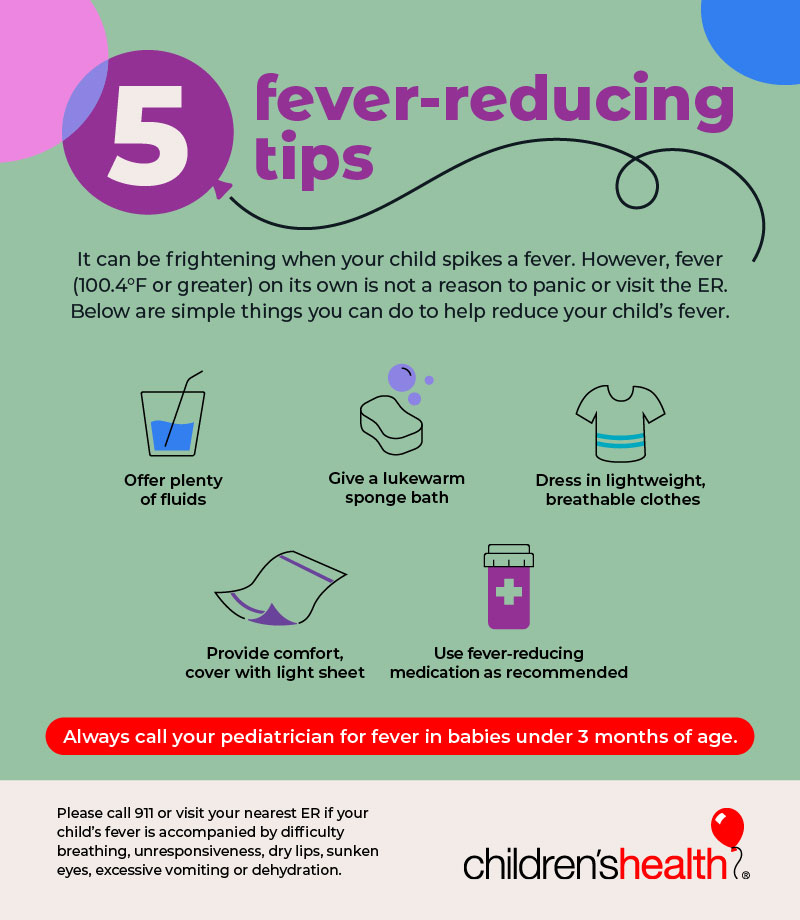
Home Remedies To Manage Fever
Discover effective home remedies for managing fever in babies. Learn when to seek medical help to ensure your little one’s well-being.
When your baby has a fever, it can be a scary and stressful time for parents. However, there are some home remedies that can help manage a fever and make your little one more comfortable. Remember, if your baby’s fever is high or lasts for more than a few days, it’s important to seek medical attention. Here are some home remedies to help manage your baby’s fever:
Maintaining Hydration
It’s important to make sure your baby stays hydrated when they have a fever. Offer frequent small sips of water, breastmilk or formula if they are not vomiting. You can also try giving your baby an electrolyte solution to help replace any fluids they may have lost. Avoid sugary drinks, as they can make your baby’s fever worse.
Dress Lightly
Dressing your baby in lightweight clothing can help their body cool down and regulate their temperature. Avoid heavy layers or blankets, as they can trap heat and make the fever worse. Keep the room cool and well-ventilated to help your baby feel more comfortable.
Use Of Fever-reducing Medications
If your baby’s fever is high or causing discomfort, you can give them fever-reducing medications like acetaminophen or ibuprofen, which are available over-the-counter. However, it’s important to follow the dosage instructions carefully and not to exceed the recommended amount. Never give aspirin to a child under 18 years of age, as it can lead to a rare but serious condition called Reye’s syndrome. Remember, these home remedies are meant to help manage a fever, not cure it. If your baby’s fever persists or is accompanied by other symptoms like a rash or difficulty breathing, it’s important to seek medical attention right away.
Preventive Measures
Preventing fever in babies is crucial for their well-being. By following certain measures, you can safeguard your little one from unnecessary discomfort and health risks.
Vaccinations
Boldly, stay up-to-date with your baby’s vaccination schedule to prevent fever-causing illnesses.
Good Hygiene Practices
Teach kids good hygiene habits such as frequent handwashing to ward off infections.
Tips For Monitoring Fever
When caring for a baby with a fever, it’s crucial to monitor their temperature closely. Here are some essential tips to help you effectively track and manage your baby’s fever:
Using Thermometers
Choose a reliable digital thermometer for accurate readings.
- Opt for a rectal thermometer for infants under 3 months.
- Use an ear or forehead thermometer for older babies.
Recording Temperature Changes
Document your baby’s temperature at regular intervals.
- Record the time and temperature each time you check.
- Keep a log to track the fever progression over time.
Myths Vs. Facts About Fever In Babies
Myth: Fevers Always Cause Brain Damage
Fact: Fever is Often a Sign of the Body Fighting Infection
Myth: Fevers Always Cause Brain Damage
Fact: Fever is Often a Sign of the Body Fighting Infection
When Should I Take My Baby To The Er For A Fever?
If your baby has a fever over 100. 4°F and is under 3 months old, go to the ER immediately.
When Should I Be Concerned With My Baby’s Fever?
You should be concerned with your baby’s fever if it is over 100. 4°F (38°C) for infants under 3 months or over 102°F (38. 9°C) for children 3 months or older. Other symptoms that may indicate a serious condition include difficulty breathing, lethargy, vomiting, and seizures.
Contact your pediatrician if you’re concerned.
How Long Can A Baby Safely Have A Fever?
A baby can safely have a fever for 2-3 days. Seek medical attention if fever lasts longer.
When To Worry About Baby Temperature?
If your baby’s temperature is over 100. 4°F or under 97. 8°F, seek medical attention. Monitor for signs of distress, such as lethargy or difficulty breathing. Use a digital thermometer for accuracy. Keep in mind that teething can cause a slight rise in temperature.
Conclusion
As a parent, staying informed about your baby’s health is crucial. Recognizing when to seek medical attention for a fever is essential for their well-being. Remember to trust your instincts and consult a healthcare professional if you have any concerns.
Your baby’s health and safety are always a top priority.

